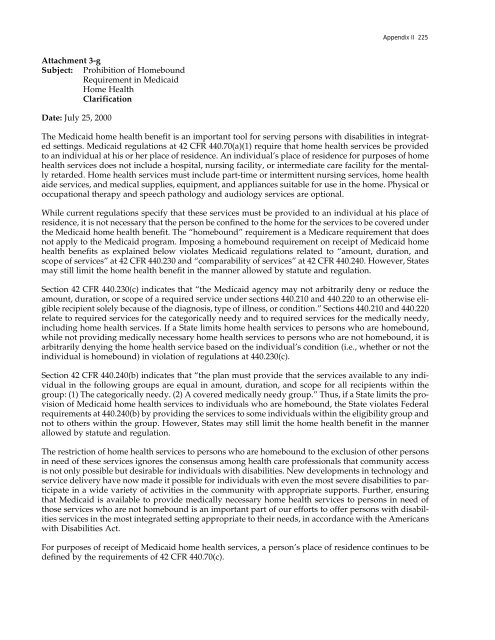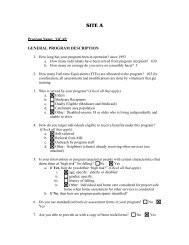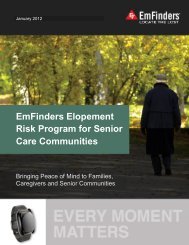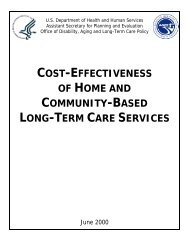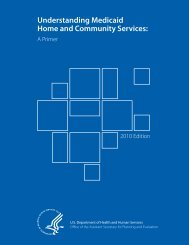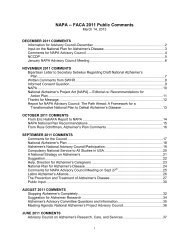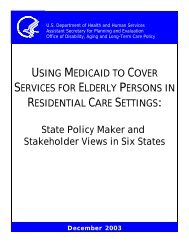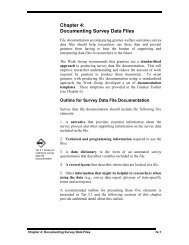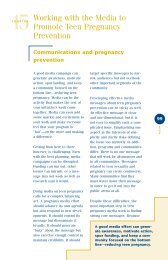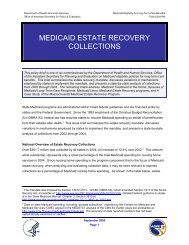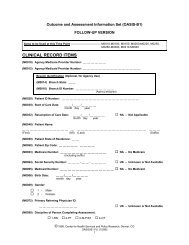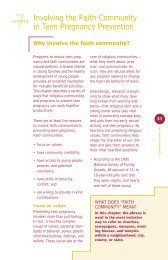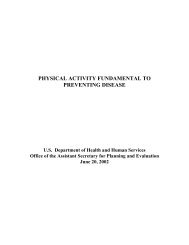Full PDF Version - ASPE - U.S. Department of Health and Human ...
Full PDF Version - ASPE - U.S. Department of Health and Human ...
Full PDF Version - ASPE - U.S. Department of Health and Human ...
- No tags were found...
Create successful ePaper yourself
Turn your PDF publications into a flip-book with our unique Google optimized e-Paper software.
Appendix II 225Attachment 3-gSubject: Prohibition <strong>of</strong> HomeboundRequirement in MedicaidHome <strong>Health</strong>ClarificationDate: July 25, 2000The Medicaid home health benefit is an important tool for serving persons with disabilities in integratedsettings. Medicaid regulations at 42 CFR 440.70(a)(1) require that home health services be providedto an individual at his or her place <strong>of</strong> residence. An individual’s place <strong>of</strong> residence for purposes <strong>of</strong> homehealth services does not include a hospital, nursing facility, or intermediate care facility for the mentallyretarded. Home health services must include part-time or intermittent nursing services, home healthaide services, <strong>and</strong> medical supplies, equipment, <strong>and</strong> appliances suitable for use in the home. Physical oroccupational therapy <strong>and</strong> speech pathology <strong>and</strong> audiology services are optional.While current regulations specify that these services must be provided to an individual at his place <strong>of</strong>residence, it is not necessary that the person be confined to the home for the services to be covered underthe Medicaid home health benefit. The “homebound” requirement is a Medicare requirement that doesnot apply to the Medicaid program. Imposing a homebound requirement on receipt <strong>of</strong> Medicaid homehealth benefits as explained below violates Medicaid regulations related to “amount, duration, <strong>and</strong>scope <strong>of</strong> services” at 42 CFR 440.230 <strong>and</strong> “comparability <strong>of</strong> services” at 42 CFR 440.240. However, Statesmay still limit the home health benefit in the manner allowed by statute <strong>and</strong> regulation.Section 42 CFR 440.230(c) indicates that “the Medicaid agency may not arbitrarily deny or reduce theamount, duration, or scope <strong>of</strong> a required service under sections 440.210 <strong>and</strong> 440.220 to an otherwise eligiblerecipient solely because <strong>of</strong> the diagnosis, type <strong>of</strong> illness, or condition.” Sections 440.210 <strong>and</strong> 440.220relate to required services for the categorically needy <strong>and</strong> to required services for the medically needy,including home health services. If a State limits home health services to persons who are homebound,while not providing medically necessary home health services to persons who are not homebound, it isarbitrarily denying the home health service based on the individual’s condition (i.e., whether or not theindividual is homebound) in violation <strong>of</strong> regulations at 440.230(c).Section 42 CFR 440.240(b) indicates that “the plan must provide that the services available to any individualin the following groups are equal in amount, duration, <strong>and</strong> scope for all recipients within thegroup: (1) The categorically needy. (2) A covered medically needy group.” Thus, if a State limits the provision<strong>of</strong> Medicaid home health services to individuals who are homebound, the State violates Federalrequirements at 440.240(b) by providing the services to some individuals within the eligibility group <strong>and</strong>not to others within the group. However, States may still limit the home health benefit in the mannerallowed by statute <strong>and</strong> regulation.The restriction <strong>of</strong> home health services to persons who are homebound to the exclusion <strong>of</strong> other personsin need <strong>of</strong> these services ignores the consensus among health care pr<strong>of</strong>essionals that community accessis not only possible but desirable for individuals with disabilities. New developments in technology <strong>and</strong>service delivery have now made it possible for individuals with even the most severe disabilities to participatein a wide variety <strong>of</strong> activities in the community with appropriate supports. Further, ensuringthat Medicaid is available to provide medically necessary home health services to persons in need <strong>of</strong>those services who are not homebound is an important part <strong>of</strong> our efforts to <strong>of</strong>fer persons with disabilitiesservices in the most integrated setting appropriate to their needs, in accordance with the Americanswith Disabilities Act.For purposes <strong>of</strong> receipt <strong>of</strong> Medicaid home health services, a person’s place <strong>of</strong> residence continues to bedefined by the requirements <strong>of</strong> 42 CFR 440.70(c).


